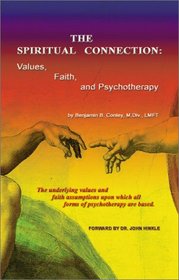Search -
The Spiritual Connection : Values, Faith, and Psychotherapy
The Spiritual Connection Values Faith and Psychotherapy
Author:
FROM THE FORWORD The author of this book has an appreciation for both scientific and spiritual worlds as these bear on an understanding of humanness and the processes of change. He has read widely and well concerning the relationship between values, faith, spirituality, and accountability/responsibility. The insights from these readings ar... more »
Author:
FROM THE FORWORD The author of this book has an appreciation for both scientific and spiritual worlds as these bear on an understanding of humanness and the processes of change. He has read widely and well concerning the relationship between values, faith, spirituality, and accountability/responsibility. The insights from these readings ar... more »
ISBN-13: 9780970822147
ISBN-10: 0970822146
Pages: 256
Rating: ?
ISBN-10: 0970822146
Pages: 256
Rating: ?
0 stars, based on 0 rating




